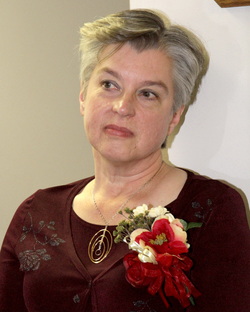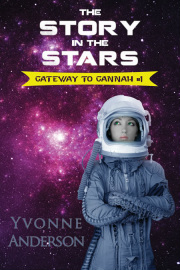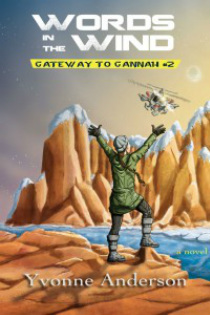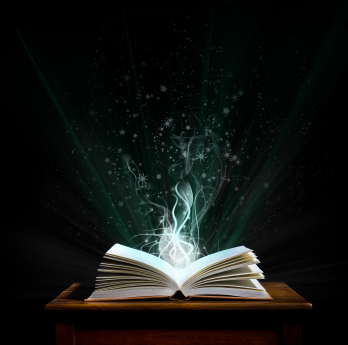
Yvonne, like me, is a "late entry" into the fiction-writing world, having pursued other vocations prior to starting her writing career. It just goes to show that writers may come from all over, but always from within.
You can connect with Yvonne at her web site, or follow her blogs at Novel Rocket and Speculative Faith. Of course, she'd love you to purchase her novels, or ask for them at your local library. Read on to hear what she has to say about her work and herself!
Yvonne Anderson, creator of the Gateway to Gannah space fantasy series, is a member of American Christian Fiction Writers (ACFW), The Lost Genre Guild, Independent Author Network, and International Thriller Writers, and serves as contest administrator for the Novel Rocket blog, named four times to Writer’s Digest’s list of the 101 Best Websites for Writers. She lives in rural Ohio but spends most of her time on the planet Gannah, researching her books.

Trust me, there’s nothing intimidating about me—I’m just me!
How does it feel to be an ACFW Carol Award Finalist? I’m not sure how to answer without sounding terribly arrogant, so I’ll just be honest: I was confident The Story in the Stars was a good story, well told. When it was named a finalist, I was neither surprised nor thrilled. I just took it as validation that my opinion wasn’t the personal bias we all have, I think, concerning our own “children.” In other words, it was encouraging, but not a big deal.
As to your second question, do you think readers pay attention to awards: Receiving (or being a finalist for) an award doesn’t turn a book into an overnight bestseller. But no one’s going to buy a book or check it out from the library, or however he obtains his reading material, if he’s never heard of it; recognition is important when a reader makes a selection. So anything that brings attention to the title and/or the author’s name is a good thing, long-term.
You say that the idea for the Gannah series came from a 19th century nonfiction book, only the style of the language was off-putting. Do you read “antique” fiction as well? If so, how do you respond to it? What is it about the differences in language and style today that you find more accessible?
I read a variety of genres and styles. Whether I prefer the old classics or something more modern depends on my mood. There are huge differences in style, and there’s something to be said for all of them. Currently, omniscient point of view is discouraged, and I think that’s a shame; I love omniscient, I love a book where the writer talks directly to the reader and breaks today’s “rules” about “author intrusion” and “head-hopping.” The current trend toward “deep POV” often seems unnecessarily limiting and, in my opinion, irksome. But it is what it is. I think the important thing is to do whatever you do well. You can ruin a book by breaking the rules, and you can ruin one by adhering to them too closely.
Concerning that old nonfiction book that originally inspired The Story in the Stars: I dug it out and started reading it last year and found it perfectly understandable. I had none of the difficulties following it that I’d had the first time around. It’s all a matter of timing, I think.

I don’t outline anything. I start with a beginning in mind, an end, and a couple of high points that must occur along the way.
The Story in the Stars was supposed to be a stand-alone. But about halfway through the writing of it, I could see too many things had to happen before we got to the end I’d originally planned, so I had to choose a different stopping point. I was more or less content to leave it there, but while pitching it, I started a sequel to further explore some of the fun things I’d discovered about Gannah I hadn’t been able to fit in (and, of course, work toward that conclusion I’d envisioned). I hadn’t quite finished Book 2 when Risen Books offered me a three-book contract for the series. By that time, I could see the end I wanted was still too far away for the scope of the 2nd book, so it would be no problem coming up with a story line for a third.
Because I’m not a planner, I’m constantly surprised. That’s one of the things that keeps me going. When you read a book, you want to keep reading to see what happens next. I’m the same way with writing; I know how it’s going to end, but that’s all I know. Everything else unfolds as I go, and I’m often as surprised as the reader.
What is it about the science fiction genre that drew you to it? Does the inherent “otherworldliness” of sci fi make it easier or more difficult to frame plot and character? Do you dabble in other genres?
Strange to say, I’ve never much cared for science fiction, and I still can’t say it’s my favorite genre. Before writing The Story in the Stars, I’d written some historical and contemporary fiction but never in my wildest dreams had I contemplated writing sci-fi. But after struggling with that aforementioned nonfiction book, The Gospel in the Stars, I guess I had stars on the brain. When I started writing a story in which the characters discovered the gospel in the constellations, it seemed to call for a space setting despite my lack of experience with that sort of thing.
I suppose writing this genre is easier, in ways, than historical or contemporary, because you don’t need to make sure every detail is factual; if I say it’s true, it is, because I’m making it all up. But that only goes so far. For a story to be believable, it must be based on certain truths, such as human nature or natural laws. Moreover, once you create a world, everything within that world has to be consistent.
So, apart from the fact that I don’t have to do a lot of historical research, I can’t say it’s any easier to frame plot or character when writing in this genre. The same rules of story structure hold true no matter what the setting. And every character, whether it’s a human or a Karkar or an elf or a fish, must have believable motives and goals.

I have no favorite novel, no favorite author, though I will say that sometimes when I read, I find myself saying, When I grow up, I want to write like that! Authors whose books have prompted that response include Graham Greene, Anne Lamott, Amy Tan, Suzanne Collins, and Neil Gaiman. (An example from the last-mentioned author: “The house smelled musty and damp, and a little sweet, as if it were haunted by the ghosts of long-dead cookies.” How can you not want to emulate that?)
I seldom feel stuck and can’t relate to the concept of “writer’s block.” I often have trouble finding the time to write, but not what to write. If I struggle with a chapter or a scene, I’ll work on something else—a different scene, a blog post, or whatever. There’s always something that needs to be put into words.
Where did you get the cover art for your books? It's great.
I place all credit or blame, depending on which side of the fence you view this from, on my publisher.
You’re an active blogger. Do you ever find it challenging to balance the “platform” stuff with the actual writing? Have you managed to create a community for your books?
First question: Oh, my, yes. Second question: Oh, my, no.
What’s over the horizon after the Gannah series?
Oh, my, lots of options swirling in my head, but none have yet solidified. I’m currently drafting the fourth and last book in the series. (Though it’s not included in my contract with the publisher, I had to write it in order to finally reach that original ending I had in mind at the beginning.) Once I get Gannah out of my system, I’ll be ready to make decisions as to where I go next.
If you could visit yourself in the past or in the future, which would you choose and why?
I wouldn’t. What’s done is done—we get no do-overs—and the future is yet to be written. I’m a pantser, remember?
Anything else you’d like to tell us?
I’ve always loved books, but I never had any interest in writing one until I was well into my 40s and felt God moving me in that direction (much to my dismay). Rather than “following my dream,” writing is an act of following His leading, one step at a time. He doesn’t always take me where I want to go, but I know the best place for me to be is wherever He puts me. That’s all the “success” I care to pursue.

 RSS Feed
RSS Feed